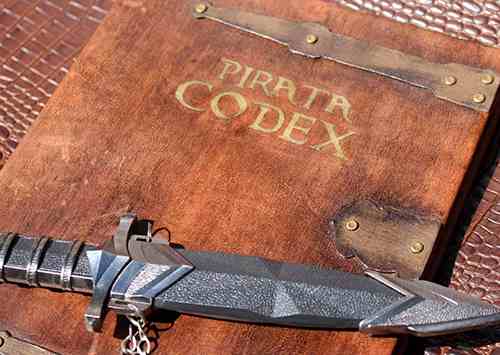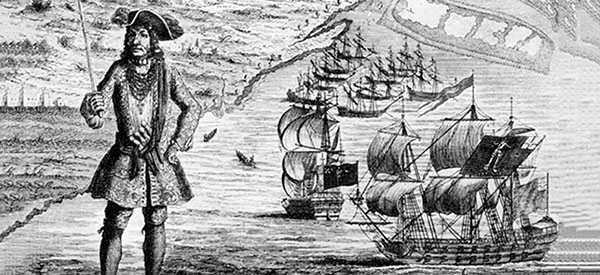This article is about the Privateers who were called the good pirates of the 17th and 18th Century working under the British Crown. They were seizing only Spanish royal ships and even “bad” pirate ships.
Pirates roamed and ruled the high seas for centuries. But even with the plundering, the life of a pirate privateer was never an easy one.
A Life of Glamour – Not So Much
Literature and film have painted a picture of jolly, rum-drinking, womanizing scalawags. They depict life on the raging seas as exciting and glamorous. Hollywood’s version couldn’t be further from the truth.
In reality, pirates rarely lived to middle age. They almost never ended up rich and they were far more careworn than carefree. Boredom, disease, malnutrition and violence all conspired to shorten their time on Earth. Not to mention the unforgiving sea herself.
The Pirate’s Code
Life on a pirate ship was often based on a set of articles agreed upon by the captain and crew before sailing. This set of rules is popularly known as “The Pirate Code”. There are many variations, but most agreements have some similarities. They ensured a kind of democracy and order while at sea.
The Code was essential for their survival because if not complied with, the entire crew could end up starving leading to mutiny and jeopardizing the journey.
Below are a few provisions from a 1721 version of pirate Bartholomew Robert‘s (aka “Black Bart”) Shipboard Articles. These are the interesting and relevant articles from a survivalist point of view.
Bartholomew Robert’s Pirate Code:
- Each sailor is to have an equal vote in all affairs of moment
- He that shall desert the ship or his quarters in time of battle shall be punished by death or marooning (left alone on an uninhabited island).
- Every man who shall become a cripple or lose a limb in the service shall have 800 pieces of eight from the common stock and for lesser hurts proportionately.
- None shall strike another on board the ship, but every man’s quarrel shall be ended on shore.
- The lights and candles should be put out at eight at night, and if any of the crew desire to drink after that hour they shall sit upon the open deck without lights (editor’s note: that’s probably because they didn’t want to be seen at night)
- All sailors are to keep their cutlass, piece and pistols clean, fit and ready for service.
- Every man shall be called fairly in turn by the list on board of prizes, because over and above their proper share, they are allowed a shift of clothes. But if they defraud the company to the value of even one dollar in plate, jewels or money, they shall be marooned. If any man rob another he shall have his nose and ears slit, and be put ashore where he shall be sure to encounter hardships.
- None shall game for money either with dice or cards.
- Every man is entitled to any seized fresh provisions or strong liquors. These are to be used at their pleasure – except in times of scarcity. For the good of the entire crew, a retrenchment vote can occur.
- Confiscated provisions and prizes are to be distributed accordingly: two shares each to the captain and the quartermaster; one and one-half shares to the master, boatswain and gunner; lesser officers receive one and one-quarter shares with all other sailors getting one share.
Fresh Provisions and Strong Liquors
Of primary importance to most pirates was food and drink – the provisions. Pirates enjoyed their strong liquors and food, when they were plentiful. They lived, ate and drank like kings at the beginning of a journey, when they refit the ship at ports of call or after they plundered a captured vessel. But during lean times, it was the polar opposite. The crew could die of starvation in a short amount of time if the provisions ran out.
Starvation could be more of a threat than any enemy. Malnutrition and disease were directly related to the food supplies. Fresh provisions were sought after and valued more than any gold or treasure. Supplies became depleted after unexpected or extended months at sea. Bad weather, a crippled ship, sick crew or even just poor seamanship were often the causes. It was critical for the ship to have a stockpile of sufficient supplies to get them from one point to another.
The Stockpile
The quartermaster or ship’s cook were usually assigned to stockpiling supplies for the trip. They had to determine what provisions would be needed for each journey for each pirate.
A regular week’s worth of rations for each sailor might consist of some basics: salted meat, vegetables, oatmeal, butter and cheese. Water and alcohol were included in the rations. Because water didn’t stay fresh for long, alcohol was often added to the casks – pirates’ preferred drinks were beer, ale and obviously rum. Watered-down rum became known as “grog” and was the beverage served with most meals.
Along with water and alcohol, other staples often supplemented the rations:
- Salt, sugar and spices
- Fermented foods such as sauerkraut
- Pickled goods – cucumbers, eggs and others
- Fresh or dried fruit and vegetables
- Dried or smoked fish
- Hardtack – a bread made from flour and water that had a long shelf-life
Captains who understood basic nutrition ensured their crews had help fighting malnutrition and scurvy. Fresh fruit, fermented foods and even straight vinegar were available to them. The term “limey” stems from barrels of limes often brought on board for the crew.
Depending upon the ship’s size and voyage’s length, it was not uncommon to find livestock aboard. Cattle, pigs, sheep, goats and chickens were often along for the ride. They paid for their passage with milk, eggs and ultimately, with fresh or preserved meat.
Related: DIY Chicken Tunnel (Step-by-Step Guide)
Methods of Preserving Food
Keeping food safe is a problem that dates back to cavemen. There is evidence that they dried meat on rocks in the sun. This early dehydration is thought to be the original method of preservation. Pirates were no different from their cave-dwelling ancestors as they often dried fresh fish or meat on the deck of their ships.
The shipboard stockpile consisted of foods preserved by various means. These methods included dehydration, salting, pickling, smoking, fermentation and canning. The majority of these foodstuffs were brought on board already preserved. But it was possible for sailors to do some of their own preserving while underway.
Related: How to Build a Smokehouse In Your Backyard (with Pictures)
Salting foods has always been a popular method of preservation. Casks of salt were something no ship sailed without. Sailors ate many foods kept this way including meats, vegetables and even eggs. Freshly laid eggs stored in a barrel and covered with salt could remain edible for almost a year.
Meat that was “cured” using salt would also store fairly well. As with the eggs, the only ingredient needed was the actual salt. It was used to cover slabs of meat in barrels or crocks. The meat would taste salty, but was safe and edible. For example, beef was salted or dried, in which form it resembled black oak. Sailors often carved it into buttons and belt buckles.
Pirate Cooks and Chefs
To keep from being strung up by hungry pirates, a ship’s cook needed to be creative when the only available meat was either poorly preserved or rotting and full of maggots. The use of seasonings and spices was an art form for many galley cooks as they tried to cover bad smells and tastes. Some even found ways to make hardtack.
Being Self-Sufficient at Sea
Pirates had few options to supplement their stores while at sea. Many sailors were fishermen who added fresh fish to the menu. Some were lucky and managed to snag some of the abundant sea turtles.
Turtles were valuable for more than just their meat. They were often held alive to collect eggs. Their eggs were a delicacy and highly prized by the crew. The shells were yet another boon from catching these animals. Leisure hours were spent carving items for trade or sale in port.
Other skills and trades were useful at sea. Aboard larger ships, coopers kept busy making new barrels and repairing damaged ones. Since most supplies were stowed in barrels, the barrel maker was worth his weight in gold on a long voyage.
Related: Lost Native American Survival Skills
Many seamen were handy with a needle and thread. This particular skill set evolved out of true necessity. Most pirates were used to wearing threadbare rags, but the ship and her sails was another story. Sail mending was a continual and vital task on every ship. Unfortunately, this same skill was required for an even less pleasant task. Dead sailors were sewn up in their hammocks for burial at sea on every ship at some point.
You may also like:
 The Lost Art of Reading Nature’s Signs
The Lost Art of Reading Nature’s Signs
Do You Make These Fatal Mistakes In A Crisis? (video)
8 Tips To NEVER Get Your Car Stolen (from An Ex-Thief – Guest Post)
















Research “scurvy” on the Wikipedia website. It will talk about the importance of vitamin C on long sea voyages. According to Wikipedia, lemon juice was first used to prevent scurvy before lime juice. It is an interesting read and points to the fact that one of the most important items in your survival kit is a good supply of Vitamin C. The numbers of sailors who died of scurvy is staggering.
That is and interesting read, l.c. Chuck. I remember reading that Szent-Gyorgyi, who got the Nobel Prize for isolating vitamin C, was more excited about the fact that he found 20 TIMES more vitamin C in the adrenal glands than anywhere else in the body. But he couldn’t get anyone else excited about it…
It IS exciting if we also read The Stress of Life, by Hans Selye, who says (short form) that the body responds to ALL stress, whether mental, physical, emotional, or environmental, the same way. Which means we really need to pay attention to getting enough vitamin C in SHTF times. (Or how about now?)
The article on Szent-Gyorgyi points out that prolonged cold weather can cause a vitamin C deficiency! Never heard that before, but it makes sense.
The part of the article titled Vitamin C and the Body is very understandable. Here is the link:
https://www.acs.org/content/acs/en/education/whatischemistry/landmarks/szentgyorgyi.html#vitamin-c-and-the-body
“…it is vital to the growth and health of bones, teeth, gums, ligaments, and blood vessels. Vitamin C also plays a key role in the formation of collagen, the body’s major building protein, and is therefore essential to the proper functioning of ALL INTERNAL ORGANS (emphasis mine).”
It also says that cooking, drying, salting and processing (except for freezing, which doesn’t) break down vitamin C. Maybe the fact that the Eskimos (Inuit) eat their fish and meat raw, which preserves the vitamin C, is why they don’t get scurvy!
love these emails find them so good and give lots of ideas as to everyday as well as survival tactics keep up the good work Thanks
Very interesting and informative…as is most of your articles on the “Prepper” site!!!! I enjoy and more importantly LEARN from most of them!!!! One of my favorite sites!
On the subject of lights after dark, everyone on board a wooden ship was deathly afraid of fire, which could get out of control in a hurry. There was a single ‘smoking lamp’ lit in the galley, except during times when it was ordered to be extinguished. After dark, any light at all above decks could spoil the pilot’s or lookout’s night vision or the navigator’s ability to read the stars.
sailors were the inventors of crochet, macrame, lace-making, and knitting; off-shoots of spinning your own cordage; yarn, thread, string, rope, weaving and sewing of sails and making knots for rigging. just as carving was a popular pastime, playing with smaller weights/lengths and remnants of cordage passed the time too. wouldn’t be surprised if there were accomplished artists among the cartographers. sketching new lands, plants, birds, animals and marine life, portraiture, land and seascapes. but writing was a specialization most often reserved to aristocracy (like captains and quartermasters) as children they were sent to the monasteries to learn reading and writing, and ‘rithmetic. so if you can read, write, and figure sums, thank the Catholic monks of yore.
Sailors did NOT invent lace, crocheting, knitting or macramé or weaving. Do some research.
Catholic monks are not responsible for the first teachers or teachings in reading and writing. Teachers were around long before the church was even founded.
Confucius was one of the earliest known, recognized teachers. Plato is somewhat credited with mathematics as we know them today. Many cultures had their own form of doing math.
I am be very interested to learn about all the mathematic discoveries made by Plato. I am even more interested to learn about 17th and 18th century mariners who were influenced by Confucius, I will settle for the top 3.